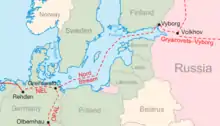OPAL pipeline
The OPAL (Ostsee-Pipeline-Anbindungsleitung) is a natural gas pipeline in Germany alongside the German eastern border. The OPAL pipeline is one of two projected pipelines connecting the Nord Stream pipeline to the existing pipeline grid in Middle and Western Europe, the other one being the NEL pipeline.
| OPAL pipeline | |
|---|---|
 OPAL pipeline near Weißenborn, Saxony | |
 Map of OPAL pipeline | |
| Location | |
| Country | Germany |
| General direction | north-south |
| From | Greifswald (Lubmin) |
| To | Olbernhau |
| Runs alongside | German eastern border |
| General information | |
| Type | natural gas |
| Partners | Wintershall Dea Gazprom |
| Operator | OPAL Gastransport GmbH & Co KG |
| Commissioned | 2011 |
| Technical information | |
| Length | 470 km (290 mi) |
| Maximum discharge | 35 billion cubic metres (1.2×1012 cu ft) per year |
| Diameter | 1,400 mm (55 in) |
Route
The 470-kilometre (290 mi) long pipeline runs from Lubmin near Greifswald to Olbernhau near German-Czech border.[1] It connects the Nord Stream pipeline with the JAGAL (distributes gas from the Yamal-Europe pipeline), and the STEGAL (distributes gas from the Central-European Russian gas transit system (Transgas) via Czech and Slovak republics) pipelines in Germany. On the German-Czech border the pipeline will be connected with the planned Gazela Pipeline, to connect gas export pipelines in the Czech Republic.[2]
Technical features
The diameter of the pipeline is 1,400 millimetres (55 in) and it has an operating pressure up to 100 bars (10,000 kPa).[1] The capacity of the pipeline is 35 billion cubic metres (1.2 trillion cubic feet) per year of natural gas. The compressor station in Radeland, Brandeburg, is built by Siemens.[3]
The pipeline cost around €1 billion. The construction was completed in 2011 and in August 2011 Nord Stream was connected with the OPAL pipeline.[4]
Project company
The pipeline was constructed by OPAL NEL TRANSPORT GmbH, a subsidiary of Wingas.[5] It is operated by OPAL Gastransport GmbH & Co KG, owned by WIGA Transport Beteiligungs-GmbH & Co. KG, a joint venture of Wintershall Dea and Gazprom.
Access by Gazprom
Polish state-run gas firm PGNiG and PGNiG Supply & Trading tried to restrict Gazprom's access to the pipeline. Oberlandesgericht Düsseldorf lifted the restrictions [6]
After the decision Gazprom increased the throughput to 72.5 million m3/d (26.462 billion/year).
See also
References
- Lochner, Stefan; Bothe, David (September 2007). "From Russia with Gas An analysis of the Nord Stream pipeline's impact on the European Gas Transmission System with the Tiger-Model" (PDF). EWI Working Paper. Institute of Energy Economics at the University of Cologne. 7 (02). Retrieved 2008-03-05.
- Markéta Hulpachová (2007-05-23). "RWE plans new pipeline". The Prague Post. Retrieved 2007-11-24.
- "Siemens wins Baltic pipeline compressor order". Offshore. PennWell Corporation. 2010-03-17. Archived from the original on 2011-01-03. Retrieved 2010-03-18.
- Blau, John (2011-08-26). "Nord Stream pipeline now connected to German link". Deutsche Welle. Retrieved 2011-09-10.
- "OPAL NEL TRANSPORT GmbH applies for exemption from regulation. Project company plans Nord Stream pipeline links" (Press release). Wingas. 2008-07-25. Archived from the original on 2011-07-19. Retrieved 2008-08-09.
- "Gazprom gets access to OPAL pipeline". 2017-07-31.
External links
| Wikimedia Commons has media related to OPAL (pipeline). |